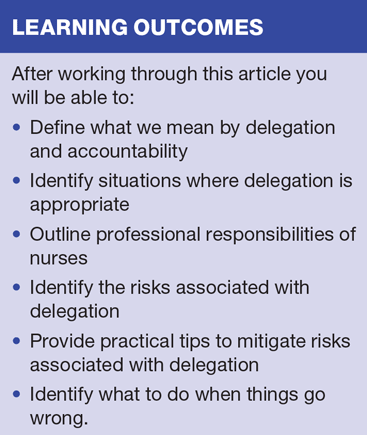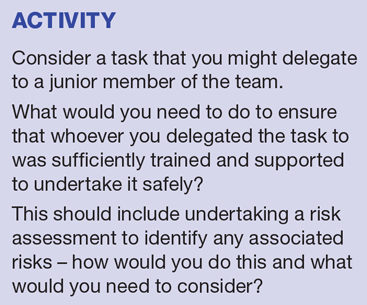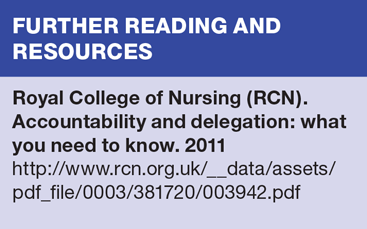Principles of delegation and accountability
Kate Taylor, RGN, Clinical Risk and Education Manager,
Kate Taylor, RGN, Clinical Risk and Education Manager,
Medical Protection Society
General practice is changing and practice nursing teams are evolving to manage the demands and pressures of modern day practice. As our roles expand to take on advanced tasks, delegation is crucial to maintain high quality patient care – but what are the risks and benefits?
According to the American Nursing Association, there is more nursing to be done than there are nurses to do it.1 This is just as true in the UK, where in the current climate of stretched resources and increasing demands, practice nursing roles are expanding to take on patient care that traditionally would have been managed by GP colleagues. This role expansion means that the need for practice nurses to delegate has never been greater. As nurses’ roles expand so too have the roles of healthcare support workers, who are now assuming responsibility for activities that used to be performed by registered practice nurses.2
This article outlines the risk management issues relating to delegation and explores nursing responsibilities and accountability.
WHAT DO WE MEAN BY DELEGATION?
Delegation in nursing has been defined as ‘to entrust or assign to another person a responsibility for a task’.3 It is interesting that this definition uses the word ‘entrust’. In practice nursing teams this could translate to both:
- The trust which the delegating nurse has in their colleague, and
- The trust the colleague to whom they have delegated has in their own competences and ability to escalate any concerns.
This in turn would reflect the patient safety culture within the practice. Much of the literature surrounding delegation describes it as a trust building activity with many benefits for the development of junior members of the team; mainly confidence building, self-esteem and effective team working, among others.
The law does not prescribe what tasks are suitable for particular healthcare professionals.4 It does, however, impose a duty of care on practitioners. This duty of care applies in all situations where there is a potential that that they might cause harm through their actions or omissions. Neither the Nursing and Midwifery Council (NMC) nor the Royal College of Nursing (RCN) offers a specific definition of delegation, yet they do provide extensive guidance for nurses to safeguard both the nurse and the patient.5,6
ACCOUNTABILITY
The RCN is clear in its guidance.6 Registered nurses have both a duty of care and a legal liability with regard to patients. If a registered nurse delegates a task they must ensure that the task has been appropriately delegated, meaning:
- The task is necessary and delegation is in the patient’s best interest
- The support worker understands the task and how it is to be performed
- The support worker has the skills and abilities to perform the task competently
- The support worker accepts the responsibility to perform the task competently.
The registered nurse who delegates remains accountable for the appropriateness of the delegation and for making a judgement about the supervision required by the person carrying out the delegated task.7 By accepting the delegated task, the support worker becomes accountable for his or her actions, although liability rests with the employer.
Within general practice it is the responsibility of the employing GP partners to ensure that the persons to whom practice nursing teams may delegate tasks have the appropriate education, training and skills to carry out those tasks. The General Medical Council (GMC) is clear; when a doctor delegates care he or she is still responsible for the overall management of the patient.8
WHEN SHOULD I DELEGATE?
Patients have increasingly high expectations of healthcare professionals, but none greater than the expectation of the same level of care regardless of when, where and by whom it is delivered. This must be taken into consideration when delegating; the patient’s best interest must always be at the forefront of any decision to delegate patient care needs to a colleague or junior member of staff.
The variety of roles within practice nursing teams provides opportunities to work collaboratively as a team. However, it is vital that each member of the team is mindful of their own sphere of competence and experience.
Although it can be useful to have up-to-date, written policies and protocols, the sheer diversity and pace of general practice makes it difficult to have a definitive list of tasks that can be delegated. Nurses, therefore, must have systems in place to ensure that they are aware of colleagues’ knowledge, skills and experience so that they are able to utilise them resourcefully. Policies and protocols can be useful in summarising what should be done, by whom, when and how. Effective communication is also vital to ensure that the delegated task is understood and accepted appropriately.
With the evolution of new roles within general practice it is vitally important that staff have clearly defined roles. Accurate job descriptions, outlining the range of duties related to specific roles, can be useful in providing clarity. It is also essential that patients understand what to expect from the differing roles within general practice nursing teams. Practices could include information relating to differing nursing roles in the practice leaflet or website. This could include details of any specialist clinics held.
PROFESSIONAL RESPONSIBILITIES OF NURSES
The Nursing and Midwifery Council Code of conduct sets out clear guidance on the professional responsibilities of a nurse in delegating nursing activities.5 You must:
- Establish that anyone you delegate to is able to carry out your instructions
- Confirm that the outcome of any delegated task meets the required standard
- Make sure that everyone you are responsible for is supervised and supported.
The Code goes on to summarise the delegator’s accountability: ‘If the nurse or midwife is delegating care to another professional, health care support staff, carer or relative, they must delegate effectively and are accountable for the appropriateness of the delegation.’
Translating this to general practice means ensuring practice teams have appropriate systems and processes in place to safeguard the delegation of any nursing activities. Some academics promote the use of the traditional nursing process from the early 1970s – assess, plan, implement and evaluate – as a means of ensuring safe delegation.
Another commonly used tool is the ‘Five Rights of Delegation’, developed jointly by the American Nurses Association and the [USA] National Council of State Boards of Nursing (NCSBN).1 These include:
- Right task – has the nurse effectively assessed the patient’s needs and determined that the task is appropriate to be delegated?
- Right circumstance – do the patient’s needs match the competency level of the person to whom the nurse is delegating the task?
- Right person – does the person to whom you are delegating have the appropriate level of knowledge, skills and abilities?
- Right communication – has the delegated task been communicated effectively and do both parties understand what is expected of them?
- Right supervision – does the delegated task have the right level of monitoring and supervision?
Each individual nurse will adopt his or her own safeguarding processes prior to delegation; however it is useful to consider a structured approach. The RCN sets out the key questions to consider when delegating to another member of the team:6
- Is the delegation in the best interest of the patient?
- Is the person you are delegating to suitably trained and have they been assessed as competent, preferably with written evidence of the assessment?
- Are there clear and robust protocols and guidelines in place?
- Does the task form part of the member of staff’s job description?
- Do the members of the team know this task has been delegated?
- Is there sufficient supervision and support available?
- Is ongoing training and development available to ensure the member of staff remains competent?
- Has a risk assessment been undertaken?
WHEN THINGS GO WRONG
Sir Liam Donaldson famously stated: ‘To err is human, to cover up is unforgivable, and to fail to learn is inexcusable.’
There will always be times when things can go wrong. General practice teams must ensure that they have a system in place for reporting adverse events and this is normally dealt with by a clinical incident reporting system. The Health and Social Care Act 2008 (Regulated Activities) Regulations 2014 (Part 3) introduced the Care Quality Commission’s fundamental standards for general practices on 1 April 2015.9 These replace the previous essential standards.
These fundamental standards include a new regulation, the Duty of Candour. The key principle of the Duty of Candour is that healthcare professionals must act in an open and transparent way in relation to the care and treatment provided to patients. They must, as soon as reasonably practicable, after becoming aware that a notifiable safety incident has occurred, notify the relevant person and provide reasonable support to him or her in relation to the incident.
This is a new requirement and practices must ensure they have systems in place to capture notifiable safety incidents, and processes for notification to and support of relevant persons. The practice should promote the reporting of incidents and ensure that all staff are aware of the organisational reporting requirements where the duty applies.
INDEMNITY
The Government has introduced a new requirement for all healthcare professionals to hold an appropriate indemnity arrangement. From 17 July 2014, it became a legal requirement for nurses and midwives to hold an indemnity arrangement in order to be registered with the NMC.
In 2014, 10% of practices visited as part of MPS’s Clinical Risk Self Assessment (CRSA) programme were unsure of their indemnity arrangements. Although it does not become a legal requirement until this summer (2015), it is still a professional requirement, and therefore it is vital that nurses working in general practice are clear about their indemnity arrangements. You have a responsibility to check what is covered under your employer’s protection.
It is the professional responsibility of each nurse to ensure that they have appropriate indemnity cover in place, that this protection reflects the risks associated with their scope of practice, and that the level of indemnity is sufficient in the event that a claim is successfully made against them.
PRACTICAL TIPS FOR SAFE DELEGATION
- Taking the five rights of delegation into consideration, is the delegation appropriate?
- Identify the support available
- Following training, assess competencies in relation to knowledge, skills and experience
- Ensure robust quality assurance, for example by peer review, or performance review
- Ensure that the practice has a system for reporting if things go wrong, including the sharing of lessons learnt with the whole practice team
- Ensure that all health care professionals have appropriate indemnity arrangements
- Ensure a robust practice protocol is in place for any delegated tasks, including when to escalate and refer on to a more senior member of the practice team.
CONCLUSION
Delegation is a professional skill requiring nurses to match patient needs with the appropriate level of skill to ensure that patient care needs are in no way compromised. The current health care system continues to work under pressures and will inevitably make the need to delegate even greater. As nurses working in general practice, we must be mindful of this and ensure safe high quality patient care.
REFERENCES
1. National Council of State Boards of Nursing (NCSBN). Joint Statement on Delegation, 1995 https://www.ncsbn.org/Delegation_joint_statement_NCSBN-ANA.pdf
2. Cox C. Legal responsibility and accountability. Nursing Management 2010; 17(3): 18-20.
3. Anderson L. General guidelines to Effective Delegation in Nursing, 2012 http://www.nursetogether.com/general-guidelines-effective-delegation-nursing
4. Scrivener R, Hand T, Hooper R. Accountability and responsibility. Principle of Nursing Practice B. Nursing Standard 2011; 25(29): 35-36.
5. Nursing and Midwifery Council. The Code; professional standards of practice and behaviour for nurses and midwives, 2015 http://www.nmc.org.uk/standards/code/read-the-code-online/
6. Royal College of Nursing. Accountability and delegation: what you need to know, 2011 http://www.rcn.org.uk/__data/assets/pdf_file/0003/381720/003942.pdf
7. Gillen P, Graffin S. Nursing Delegation in the United Kingdom. The Online Journal of Issues in Nursing 2010; 15(2): Manuscript 6. www.nursingworld.org/MainMenuCategories/ANAMarketplace/ANAPeriodicals/OJIN/TableofContents/Vol152010/No2May2010/Delegation-in-the-United-Kingdom.html
8. General Medical Council. Good Medical Practice, 2013 www.gmc-uk.org/guidance/good_medical_practice.asp
9. Health and Social Care Act 2008 (Regulated Activities) Regulations 2014 (Part 3) www.legislation.gov.uk/uksi/2015/64/
Related articles
View all Articles






